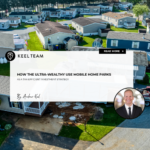Why We Walked Away from a Recent Mobile Home Park Deal: The Property Tax Trap
-
 Andrew Keel
Andrew Keel
As mobile home park investors, we’re always on the hunt for deals that can generate solid returns, particularly those with value-add potential. Recently, we had our eye on a mobile home park just outside of Grand Rapids, Michigan — a property that looked promising at first glance. But after digging into the numbers, one factor made it clear this deal wasn’t worth pursuing: property taxes. Let’s dive into how the property tax trap works.
The Tax Situation That Changed Everything
The previous owner had held the park for over 15 years. Thanks to Michigan’s property tax laws, his taxable value was only increasing by the rate of inflation each year. This meant that although the trailer park’s assessed value was roughly $2 million, his taxable value was only about $560,000. The difference between assessed value and taxable value gave him a very favorable tax situation — essentially a slow, predictable increase that kept annual taxes low.
However, in Michigan, when a property sells, the tax assessor typically re-evaluates the property and resets the taxable value to match the assessed value. In this case, that would have increased the park’s taxable value to around $2 million. The result? Property taxes would have skyrocketed by approximately 300% overnight.
Impact on Returns
For real estate investors, net operating income (NOI) drives value. With property taxes increasing that dramatically, the park’s NOI would have plummeted, turning what initially looked like a solid investment into a property with poor returns. Simply put, the tax hit would have eaten away a large portion of our potential profit, making the deal unfeasible.
Download our FREE eBook on the Top 20 things to know BEFORE investing in mobile home parks!
The Lesson for Investors
Many mobile home park investor operators don’t perform this type of in-depth research and due diligence before buying a mobile home park, and it can be a costly mistake. Property taxes are one of the most significant ongoing expenses for any trailer park owner, and sudden increases after a sale can drastically affect cash flow and ROI.
Before buying, it’s crucial to:
- Investigate the property’s taxable vs. assessed value.
- Understand how a sale could trigger a reassessment.
- Factor potential tax increases into your financial model.
Doing this kind of due diligence early can save investors from walking into deals that look profitable on paper but are cash flow traps in reality.
Final Thoughts
Walking away from a deal is never fun, but sometimes it’s the smartest move. In this case, the property tax increase made the numbers impossible to justify. For investors in Michigan — or anywhere with similar tax laws — understanding this dynamic is critical. Take the time to research, model the worst-case scenario, and don’t let overlooked tax implications eat your returns.
Are you looking for MORE information? Book a 1-on-1 consultation with Andrew Keel to discuss:
- A mobile home park deal review
- Due diligence questions
- How to raise capital from investors
- Mistakes to avoid, and more!
Disclaimer:
The information provided is for informational purposes only and is not investment advice or a guarantee of any kind. We do not guarantee profitability. Make investment decisions based on your research and consult registered financial and legal professionals. We are not registered financial or legal professionals and do not provide personalized investment recommendations.
Andrew Keel
View The Previous or Next Post
Subscribe Below 👇




